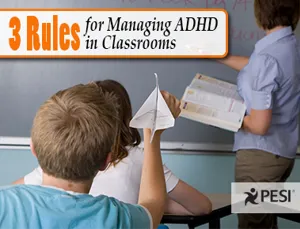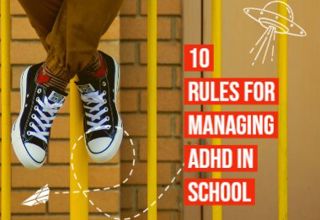3 Specific Rules for Managing ADHD

The following is based on the the book Managing ADHD in School by PESI author Dr. Russell Barkley.
The CDC reports that 6.4 million children in the United States have been diagnosed with ADHD. As the prevalence of the diagnosis continues to rise, it's important to have tools and strategies at the ready for managing ADHD in school.
Here are three classroom rules that are easy to implement and follow:
1. Rules and instructions provided to children with ADHD must be clear, brief, and often delivered through more visible and external modes of presentation than is required for the management of children without ADHD.
Stating directions clearly, having the child repeat them out loud, having the child utter them softly to themselves while following through on the instruction, and displaying sets of rules or rule-prompts (e.g., stop signs, big eyes, big ears for "stop, look and listen" reminders) prominently throughout the classroom are essential to proper management of ADHD children. Relying on the child's recollection of the rules as well as upon purely verbal reminders is often ineffective.
2. Represent time and time period externally (physically).
Children with ADHD are less capable of using their sense of time to manage their current behavior and get work done in time, over time, and on time. When short time intervals of an hour or less are required to do work, then represent that time period using a clock, kitchen timer, counting device or other external means to show the child how much time they have and how quickly it is passing. A spring-loaded kitchen cooking-time placed on the child's desk can serve this purpose. For longer time periods, break the work down into shorter periods with smaller work quotas, and allow the child to take frequent breaks between these shorter work periods.
3. Anticipation is the key with children with ADHD.
This means that teachers must be more mindful of planning ahead in managing children with this disorder, particularly during phases of transition across activities or classes, to ensure that the children are cognizant of the shift in rules (and consequences) that is about to occur. It is useful for teachers to take a moment to prompt a child to recall the rules of conduct in the upcoming situation, repeat them orally, and recall what the rewards and punishments will be in the impending situation before entering that activity or situation.
Think aloud, think ahead is the important message to educators here. By themselves, such cognitive self-instructions are unlikely to be of lasting benefit, but when combined with contingency management procedures they can be of considerable aid to the classroom management of ADHD children.
Russell A. Barkley, Ph.D., is a Clinical Professor of Psychiatry at the Medical University of South Carolina. He served as the Director of Psychology at the University of Massachusetts Medical School for more than 15 years (1985-2000) and established the research clinics for both child and adult Attention Deficit Hyperactivity Disorders.
The CDC reports that 6.4 million children in the United States have been diagnosed with ADHD. As the prevalence of the diagnosis continues to rise, it's important to have tools and strategies at the ready for managing ADHD in school.
Here are three classroom rules that are easy to implement and follow:
1. Rules and instructions provided to children with ADHD must be clear, brief, and often delivered through more visible and external modes of presentation than is required for the management of children without ADHD.
Stating directions clearly, having the child repeat them out loud, having the child utter them softly to themselves while following through on the instruction, and displaying sets of rules or rule-prompts (e.g., stop signs, big eyes, big ears for "stop, look and listen" reminders) prominently throughout the classroom are essential to proper management of ADHD children. Relying on the child's recollection of the rules as well as upon purely verbal reminders is often ineffective.
2. Represent time and time period externally (physically).
Children with ADHD are less capable of using their sense of time to manage their current behavior and get work done in time, over time, and on time. When short time intervals of an hour or less are required to do work, then represent that time period using a clock, kitchen timer, counting device or other external means to show the child how much time they have and how quickly it is passing. A spring-loaded kitchen cooking-time placed on the child's desk can serve this purpose. For longer time periods, break the work down into shorter periods with smaller work quotas, and allow the child to take frequent breaks between these shorter work periods.
3. Anticipation is the key with children with ADHD.
This means that teachers must be more mindful of planning ahead in managing children with this disorder, particularly during phases of transition across activities or classes, to ensure that the children are cognizant of the shift in rules (and consequences) that is about to occur. It is useful for teachers to take a moment to prompt a child to recall the rules of conduct in the upcoming situation, repeat them orally, and recall what the rewards and punishments will be in the impending situation before entering that activity or situation.
Think aloud, think ahead is the important message to educators here. By themselves, such cognitive self-instructions are unlikely to be of lasting benefit, but when combined with contingency management procedures they can be of considerable aid to the classroom management of ADHD children.
Russell A. Barkley, Ph.D., is a Clinical Professor of Psychiatry at the Medical University of South Carolina. He served as the Director of Psychology at the University of Massachusetts Medical School for more than 15 years (1985-2000) and established the research clinics for both child and adult Attention Deficit Hyperactivity Disorders.




